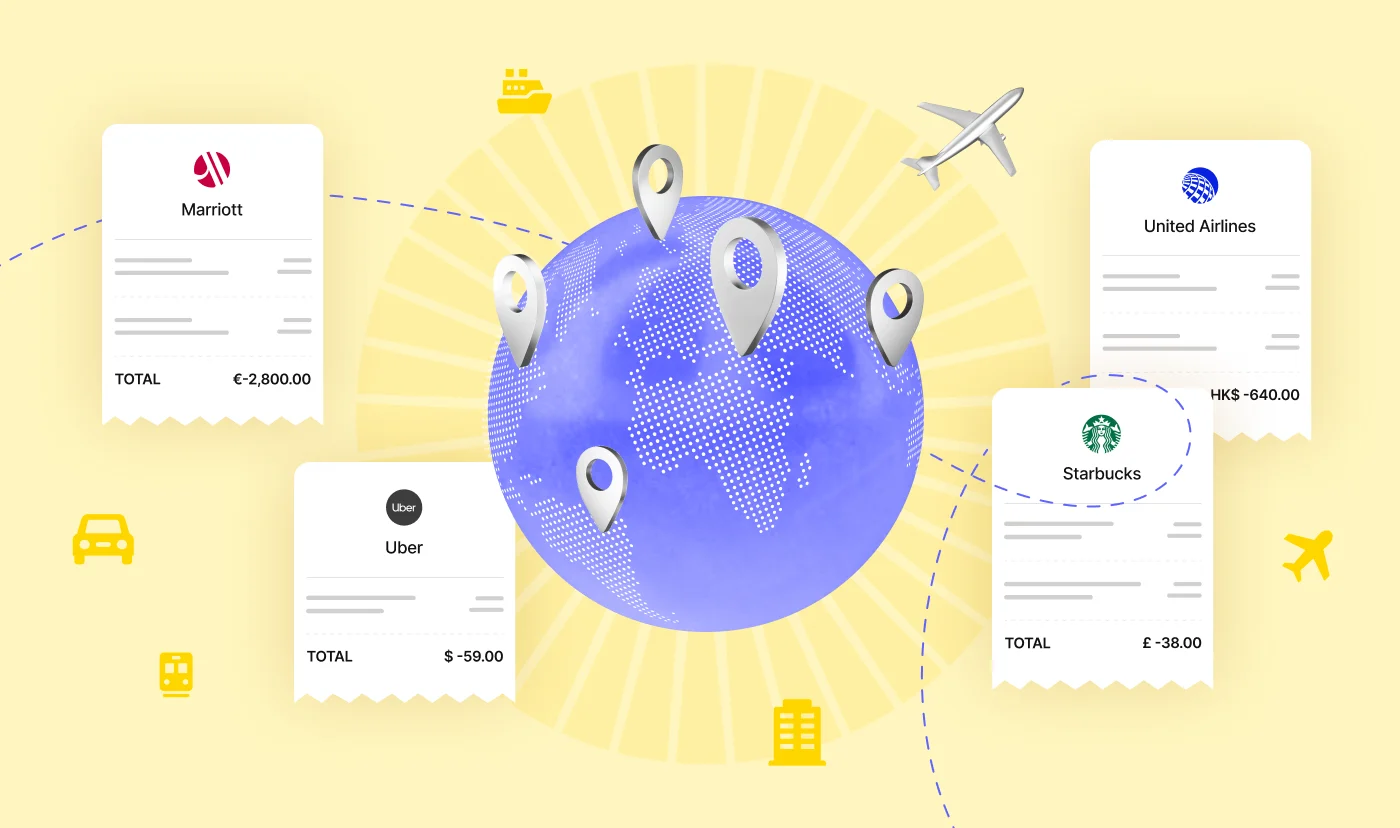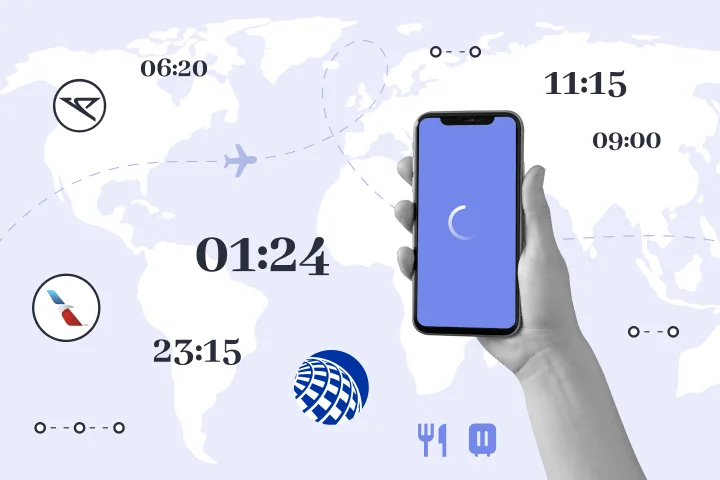

Business Travel Management: Trends, Challenges, and Solutions
Published By: Charlotte
Published On: July 2, 2024
Business travel is a fundamental aspect of corporate operations, facilitating client meetings, conferences, and partnerships across the globe. Despite its essential role, managing business travel efficiently remains a significant challenge for many organizations. This article explores the latest trends , challenges, and solutions in the business travel industry and highlights how Routespring, a top-rated and easiest-to-use travel management platform, is addressing these issues.
The Rebound of Business Travel
The business travel industry, severely impacted by the COVID-19 pandemic, is experiencing a robust recovery. The Global Business Travel Association (GBTA) forecasts that global business travel spending will reach $1.4 trillion by 2024, approaching pre-pandemic levels. This resurgence underscores the enduring importance of face-to-face interactions in fostering business relationships and driving economic growth.
Trends Shaping Business Travel
- Emphasis on Employee Well-being
In the post-pandemic era, companies are increasingly prioritizing employee well-being. The GBTA reports that 83% of travel managers have integrated wellness into their travel policies. This includes providing options for comfortable accommodations, flexible itineraries, and mental health support. A survey by CWT found that 96% of travel managers now consider traveler well-being crucial, up from 64% in 2016. These measures aim to ensure that employees remain productive and healthy while on the road.
- Rise of Sustainable Travel
Sustainability has become a key focus for the business travel industry. According to a Deloitte report, 58% of companies have implemented sustainable travel policies, with another 21% planning to do so within the next year. Organizations are opting for eco-friendly hotels, promoting public transportation, and investing in carbon offset programs. The GBTA notes that 89% of companies now include sustainability in their travel programs, reflecting a growing commitment to reducing the environmental impact of business travel.
- Technology Integration
Technology continues to revolutionize business travel management. Tools like Routespring streamline the booking process, provide real-time updates, and offer detailed analytics to optimize travel spending. Phocuswright’s research indicates that 73% of travel managers believe technology will significantly enhance travel management within the next three years. Features such as mobile apps, automated expense reporting, and virtual assistants are becoming standard, making travel management more efficient and user-friendly.
Challenges in Business Travel Management
- Cost Control
Controlling costs remains a top priority and a significant challenge for companies. According to a study by American Express Global Business Travel (GBT), travel and entertainment expenses can account for up to 10% of a company’s total budget. Unmanaged travel programs can lead to overspending, with hidden costs such as last-minute bookings and non-compliant expenses adding up. The GBT study found that companies with managed travel programs can save up to 15% on travel costs, highlighting the importance of structured travel policies and oversight.
- Ensuring Policy Compliance
Ensuring employees adhere to travel policies is critical for cost control and efficiency. However, compliance can be difficult to enforce. A survey by Concur found that 53% of business travelers admit to sometimes booking outside their company’s travel policy. Automated travel management systems can help improve compliance by integrating approval workflows, preferred vendor lists, and expense tracking, reducing the likelihood of non-compliant bookings.
- Traveler Safety and Security
Traveler safety is a paramount concern, especially in the current global climate. The International SOS 2021 Risk Outlook reveals that 70% of organizations anticipate travel risks will remain elevated. Companies must ensure they have robust risk management strategies, including real-time location tracking, emergency assistance, and comprehensive travel insurance. Providing travelers with resources and support can significantly mitigate risks and ensure their safety.
Solutions for Effective Travel Management
- Comprehensive Travel Policies
A well-defined travel policy is essential for effective travel management. It should cover permissible expenses, preferred vendors, booking procedures, and guidelines for sustainable travel. American Express GBT found that companies with comprehensive travel policies see a 10% to 20% reduction in travel expenses. Clear policies help streamline the booking process, ensure compliance, and control costs.
- Leveraging Data Analytics
Data analytics provides valuable insights into travel patterns, spending, and compliance. Deloitte highlights that companies using advanced analytics in their travel programs see a 10% to 20% reduction in travel expenses. Analytics tools can identify cost-saving opportunities, track policy compliance, and optimize travel budgets. Platforms like Routespring offer robust analytics features, helping companies make informed decisions and improve their travel management strategies.
- Enhancing Traveler Support
Providing comprehensive support to travelers is crucial for a smooth travel experience. This includes 24/7 assistance, real-time updates, and emergency support. According to Egencia, 85% of business travelers value 24/7 customer service highly. Ensuring travelers have access to support can minimize disruptions and enhance productivity.
- Automating Expense Reporting
Automating expense reporting simplifies the reimbursement process and reduces errors. A study by the Aberdeen Group found that companies with automated expense management systems process reports 50% faster than those using manual methods. Automation reduces administrative burden, ensures accurate expense tracking, and speeds up reimbursement times, enhancing overall efficiency.
The Role of RouteSpring in Modern Travel Management
Routespring is at the forefront of modern travel management, offering a platform that addresses the evolving needs of businesses. With a focus on ease of use, Routespring simplifies the entire travel management process, from booking to expense reporting. Its key features include:
- User-Friendly Interface: Routespring’s intuitive design ensures a seamless experience for both travel managers and employees.
- Real-Time Data: Access to real-time data and analytics helps companies track travel spending and identify cost-saving opportunities.
- Policy Compliance: Automated workflows ensure adherence to travel policies, reducing the risk of non-compliant bookings.
- Traveler Support: 24/7 customer support and real-time updates enhance traveler experience and safety.
By leveraging technology and focusing on user experience, Routespring helps businesses manage their travel programs efficiently, ensuring cost control, policy compliance, and traveler satisfaction. The platform’s comprehensive approach addresses the challenges of modern business travel, making it an invaluable tool for companies looking to optimize their travel management strategies.
Related Articles
July 17, 2024
Integrating QuickBooks for Seamless Travel Expense Management
Automating expense management with accounting software integration.

Problems Faced by TMCs and Agencies: Uncovering the Seen and Unseen
For TMC and travel agency operations, the challenges faced can sometimes extend far beyond the surface. While some hurdles are readily apparent—such as cost management, data integration, data quality and accuracy, and technology integration—there exists a host of unseen complexities lurking beneath the surface. These hidden challenges, often overshadowed by more visible issues, can significantly impact the efficiency, effectiveness, and innovation capabilities of travel managers and agencies alike.
In this blog, we discuss issues and pain points encountered in the world of travel management. From the seen challenges that demand attention to the subtle and often unseen, yet impactful, issues that often evade detection, we explore the full spectrum of challenges faced by travel professionals. By shedding light on these seen and unseen issues, we aim to provide insight, guidance, and actionable solutions to empower travel managers and agencies to navigate the complexities of the industry with confidence and resilience.
Common Issues Faced by TMCs and Travel Agencies
Travel Management Companies (TMCs) and travel agencies encounter various challenges and it is often related to data management and business operations. Here are some of the most common ones:
Data Integration
TMCs and travel agencies typically deal with a vast amount of data from various sources, including booking platforms, customer databases, supplier systems, and financial records. Integrating and consolidating this data to provide comprehensive reporting and analysis can be complex, especially if the systems used by different providers are not interoperable. Or if they are, there are timing issues or discrepancies between the systems.
Data Quality and Accuracy
Ensuring the accuracy and reliability of travel data is crucial for making informed decisions and providing high-quality service to clients. However, data quality issues such as incomplete or outdated information, duplicate records, and discrepancies between systems can undermine the effectiveness of operations and reporting.
Operational Efficiency
Streamlining business operations to improve efficiency and reduce costs is a constant challenge for TMCs and travel agencies. This includes optimizing processes such as booking management, itinerary planning, invoicing, and supplier management to minimize manual effort and maximize productivity.
Technology Adoption and Integration
Keeping pace with advancements in technology and integrating new tools and systems into existing workflows can be challenging for TMCs and travel agencies. From implementing booking automation and self-service portals to adopting AI-powered analytics and chatbots, selecting and deploying the right technologies requires careful planning and investment.
Supplier Relationship Management
Establishing and maintaining relationships with travel suppliers such as airlines, hotels, and car rental companies is crucial for negotiating favorable rates and ensuring availability for clients. Effective supplier relationship management involves regular communication, contract negotiation, and performance monitoring.
But you’ve heard this all before, especially if you have read articles from Grasp. There’s tools and solutions out there that are proven to help with all of the issues discussed above. We’re more interested in the issues that TMCs and travel agencies may not know of.
Unseen, Unnoticed and Unaddressed Issues
Time-consuming administrative tasks at travel agencies.
How much time is your accounting team spending calculating commissions, producing and distributing agent statements and responding to inquiries involving commissions? The fact is most either wouldn’t be able to accurately answer that question or have never even asked themselves that question.
This is where technology investment can help to boost the efficiency of your business as well as allow your travel agents to focus on what is most important, your clients. The best travel agent commission management systems should allow you to automate time-consuming administrative tasks and give your agents a view into their business via a portal featuring dashboards and reports.
Want to see a demo of Grasp’s agent commission management solution?
ARC Reconciliation
Speaking of “time-consuming administrative tasks”, let’s talk about ARC Reconciliation. If you hear “ARC Reconciliation” and you feel nothing, then that is wonderful. But for some, it may make their heart skip a beat or two.
Most of us know why ARC Reconciliation is important. It helps to ensure the accuracy of financial transactions between airlines and TMCs, CTDs, and travel agencies. It helps maintain data integrity, compliance with industry regulations and standards, and trust and transparency between airlines and TMCs/CTDs/travel agencies. It also enhances overall operational efficiency, controlling cost by minimizing financial errors and reducing the need for extensive audits or investigations.
So why would the mere mention of it startle so many? Because it is notoriously complex and time-consuming. Reconciliation in the travel industry, especially for TMCs, CTDs, and travel agencies, can be challenging due to many complexities such as exchanges, taxes, MCOs, etc. To add to the complexities that make ARC reconciliation difficult, it is also very time-consuming. The whole process can take anywhere from a few hours to having one FTE (or more) to accomplish,depending on your number of air transactions.
The good news is that we have the perfect thing to help settle your nerves. For a limited time, our current customers can get a free 45-day trial of graspTUESDAY, our ARC Reconciliation solution. Follow this link to read more about this offer!
Unclaimed Hotel Commissions
Did you know on average $59 of hotel commission is missed per booking? That is a lot of missed revenue, especially considering that hotel commissions are a significant source of income for travel agencies. At Grasp, we have graspHOPR which actively rates the hotel properties on if they pay, and if they do, how quickly they pay. It gives corporate and leisure agencies as well as CTDs the insight to book hotel reservations that support their business, to select hotel properties that will pay and pay faster. But what most don’t know is that it is dependent on accurate and timely commission logging from the agents themselves. Implementing commission logging practices can streamline commission tracking, improve accuracy, and ultimately enhance profitability by ensuring that agencies capture and reconcile all commissions owed. By leveraging technology to automate commission logging processes, travel agencies and TMCs can optimize revenue streams, strengthen supplier relationships, and achieve greater financial transparency and efficiency in hotel booking management.
Click here to learn more about some common misconceptions about hotel booking commissions.
Dependency on Legacy Systems
TMCs and travel agencies that rely on legacy IT systems may face hidden challenges related to system limitations, outdated technology, and interoperability issues. Legacy systems may lack the flexibility and scalability needed to support evolving business requirements, hindering innovation and agility in responding to market changes. And to make matters worse, many travel teams are still facing issues with outdated equipment, where access to the back office still has to be done through a single desktop located in an office. And similarly for the GDS print manager/module, that it resides on a single desktop that might be standalone or part of an existing agent’s desktop.
If any of this sounds at all familiar to you, the solution is simple. Cloud hosting is a popular option for those who are looking to outsource their infrastructure while cutting down on the costs and effort associated with maintaining servers. It allows access into the back office from anywhere, any time and also includes technologies such as GDS, CRM, Microsoft Office, and more. And to top it off, cloud hosting technologies designed by travel technology professionals ensure that your data is protected and recoverable in case of disaster. It is the very definition of getting more for less.
Want to learn more about how Grasp can help you move away from outdated technology and equipment with cloud hosting?
Treating pain points, both seen and unseen
At Grasp, we see ourselves not just as providers of solutions, but as doctors diagnosing and treating the pain points that afflict TMCs and travel agencies. While many issues are visible and acknowledged, it's the unseen complexities that often go undetected, exacerbating operational inefficiencies and hindering growth. By shedding light on these hidden challenges and offering innovative solutions, we aim to empower travel professionals to overcome obstacles with confidence and resilience. Through strategic partnerships and cutting-edge technology, Grasp is committed to driving positive change in the travel industry, ensuring that our clients thrive in an ever-evolving landscape. Let us be your partner in transforming unseen obstacles into opportunities for success.
How Analytics Can Transform the Corporate Travel Industry
Unlocking profitability: the critical role of commission logging in hotel booking management.
- English (CA)
- English (UK)
- Deutsch (DE)
- Deutsch (CH)
The 2024 guide to corporate travel management
What is corporate travel management, what does a corporate travel manager do.
- Booking trips for travelers (not only c-suite executives, but employees in any role)
- Helping individual departments track their travel spend so they can stay under budget.
- Providing travel support to travelers before, during, or after their trip.
- Selecting and managing any travel vendors or travel tools used.
- Working to negotiate corporate rates on hotels that the company uses often.
- Booking group travel.
- Organizing ground transportation like rental cars or rail
- Analyzing company travel spend, or delivering travel spend reports to the CFO for analysis
What does a travel buyer do?
Stakeholders in the travel management process.
- In-house corporate travel manager
- Office manager or office team
- Head of operations / COO
- CFO and finance managers
- Panel of frequent employee travelers
- Current corporate travel agency or company
What solutions are companies using to book their business trips?
Consumer booking sites, traditional travel agencies, travel management software.
?)
Save your company time and money on business travel
What are the drawbacks of each solution.
- Need to compare various websites and pay out of pocket in order to secure the best price
- Many hidden costs, with fees for cancellations and changes
- Many back-and-forth emails when booking for companies
- Need to pay upfront
- No support for issues on the road
- Time-consuming manual reimbursing and expense tracking
- Impossible to ensure compliance with company travel policy
- Online booking tools are typically buggy, with bad UX
- Employees end up calling support or book, when they’d rather save time by booking for themselves, with the options they want
- Costly service
- Above-market transport/accommodation prices
- Company policy compliance is difficult to guarantee
- Lack of travel inventory and options
- Clunky user experience that travelers don’t enjoy
- Offshore customer service, typically ranked as the top frustration in customer reviews
- Often overly complicated and feature-laden
- Impossible to control travel when travelers can’t or won’t use the tool
- Lacks low-price flights and hotels available online
- Impossible to guarantee company policy compliance
The pillars of modern travel management:
- Trust – Trust travelers to book using the approved process and policy, and make it easy for them
- Transparency – Let travelers see what they’re allowed to spend and choose accordingly, and let finance and administrative teams see what is being booked and why.
- Simplicity – Create a process that works and meets everyone’s needs.
- Impact – Measure the impact of business travel on the company and reduce unnecessary trips that leave travelers exhausted and businesses with needless expenses.
- Duty of care – Ensure a thorough duty of care strategy is in place to mitigate risks for employees when traveling
- Sustainability – Being aware of the impact of travel on the environment and adopting good practices to reduce the effect
How can a good corporate travel program help companies to save money?
Ensuring compliance with company travel policy, access to more affordable flight options, stay on top of travel spending trends, six steps to managing corporate travel effectively.
- Choose a smart booking tool
- Assure 24/7 travel support
- Create policies and approval workflows
- Organize and utilize travel spend data in real-time
- Improve collaboration between admin and finance
- Reduce your company’s carbon footprint
1. Choose a smart booking tool
- Self-booking within policy – Trust your travelers to book what they need, and set up policies and parameters
- Consolidated invoicing – The ability to get one monthly invoice for all travel from one vendor, instead of having it spread across the web
- Travel spend reporting – Easy access for all finance and administrative team members who need to track travel itinerary details and spend by cost centers, tags or labels
- Easy booking process that travelers love – Invoice consolidation and accurate reporting are impossible if employees want to cheat on the approved tool, so choose a tool that’s easy to use with consumer-grade UX. Make their entire travel experience, from booking to coming home, as easy and smooth as possible. Introducing a mobile app is just an added bonus!
- Great inventory – Inventory is not a side note. Make sure the platform you use has every available option you can find online and that the company is committed to adding more inventory
- Travel support – You need travel assistance that’s available 24/7 in your native language so that employees can get help even when the internal admin team is unavailable
2. Assure 24/7 travel support
Here are the requirements to look for in travel support:.
- Available 24/7
- Easy to reach a real human
- Guaranteed follow-up and follow-through
- Native language support
- Fast escalation for big issues
3. Create policies and approval workflows
- Maximum cost of airfare
- Maximum cost per hotel per night
- Minimum amount of days booked in advance
- Hotel star rating
- Flight class allowed
?)
Travel Management: The Ultimate Guide
Approval workflows.
- No approval required for any trip
- Approval required for some trips
- Approval required for every trip
4. Organize and utilize travel spend data
- Cost centers – Does your company use different payment accounts for different geographical regions? How many cost centers does the company have? Make sure that travel spend is getting charged to the right accounts and that you're making accurate expense reports.
- Tags and labels – Beyond cost centers, are there any important filters that the finance team would have to have when viewing travel spending reports? For example, would they like each trip tagged by team or by project? Decide upfront so that the tagging system can be implemented clearly from the get-go.
- Keep all travel in one place – to get accurate travel data, you need to keep all travel in one place—whenever possible. Work with a travel management solution that integrates with providers that matter to your company, such as budget airlines, AirBnb or European train lines. If your company has negotiated hotel rates, you want your corporate solution to be able to book those rates for you, so you don’t lose the travel data by booking directly.
5. Improve collaboration between admin and finance
- Streamlined approvals process – If your approval process requires action from the admin and the finance team, try to make this as seamless as possible.
- Easy access invoices – The finance team needs to grab all invoices quickly so they can reconcile expenses and set clear reimbursement processes. The best way to do this is to use a platform that consolidates travel spend into one monthly invoice.
- Ability to track spend instantly – Consolidate all travel spend into one platform so that they can generate reports on what is being spent, by who, and why (when using tags and labels). Same as with the invoices, determine whether you need to send them a monthly report, or if they want to download it themselves.
- Cost savings on trips – Fixing travel isn’t just about saving time. Many businesses are still using travel booking platforms that were built in the 80s and 90s. This means that they markup the inventory so that the company is paying more than a consumer would! Impress the finance team by reducing travel costs and introducing consumer-grade prices for trips.
6. Reduce your company’s carbon footprint
- Work out your starting point by calculating your company’s travel carbon footprint
- Design a green business travel program, which creates data-driven strategies to increase employee commitment
- Choose economy class
- Reduce your fuel consumption where possible
- Pick low-emission airlines and avoid layovers
- Vet your accommodation for sustainability practices
- Utilize green travel tax breaks
The bottom line: it's time to upgrade your travel management
Let’s bring it all together.
- Choose a smart booking tool – Meet everyone’s needs
- Share the burden of travel support – Don’t try to do this alone
- Set up cost centers and labels – Let the tool reflect the business
- Create policies and approval workflows – Put the policy inside the booking process
- Improve collaboration between admin and finance – Grab invoices and reports
?)

Make business travel simpler. Forever.
- See our platform in action . Trusted by thousands of companies worldwide, TravelPerk makes business travel simpler to manage with more flexibility, full control of spending with easy reporting, and options to offset your carbon footprint.
- Find hundreds of resources on all things business travel, from tips on travelling more sustainably, to advice on setting up a business travel policy, and managing your expenses. Our latest corporate travel resources and blog posts have you covered.
- Never miss another update. Stay in touch with us on social for the latest product releases, upcoming events, and articles fresh off the press.
?)
- Business Travel Management
- Offset Carbon Footprint
- Flexible travel
- Corporate Travel Resources
- Corporate Travel Glossary
- For Travel Managers
- For Finance Teams
- For Travelers
- Careers Hiring
- User Reviews
- Integrations
- Trust Center
- Help Center
- Privacy Policy
- Cookies Policy
- Modern Slavery Act | Statement
- Supplier Code of Conduct
- Product updates
- Corporate travel management
- Business travel payments
- Traveler locations with Traxo
- Business travel expense management
- Corporate travel management for small businesses
- Hotels for business travel
- Flights for business travel
- Car rental for business travel
- Marketplace
- Savings calculator
- Business travel resources:
- Case studies
- Starter kit
- Popular articles:
- Guide to travel policy
- Guide to business travel and expense management
- Guide to duty of care for business travel
- Corporate travel planning for small businesses
- Best practices for business travel procurement

Top 7 business travel challenges and how to address them
From delayed flights to expense management, there are plenty of obstacles to business travel – here’s how to avoid them.

1. Unclear travel policy and communications
2. travel policy compliance.
- 3. Delayed or cancelled flights and reservations
4. Costs and budget planning
5. safety and security of travelers, 6. curbing carbon emissions, 7. having data and an overview of travelers and bookings.
When you travel for work, you’ll inevitably face certain challenges – some that are easier to anticipate, like jet lag, and others that are unexpected, like flight delays and cancellations. The best way to navigate these obstacles is to be prepared, with research and a contingency plan for when things go wrong.
To ensure your company’s business travel goes smoothly, here are seven of the most common business travel problems and how to solve them .
When a company’s business travel policy omits important details or leaves room for interpretation, business travelers can find it challenging to keep track of expenses and stay within budget during their trips. They also may not receive reimbursement if the expenses aren’t covered by the travel policy, and may end up confused and frustrated with the process. So what can you do when things go wrong?
- Corporate travel management platform – Utilizing travel and expense management software makes the process much more efficient for employees. By tracking expenses, allowing easy submission of receipts, and automatically flagging out-of-policy expenses, you can avoid common problems.
- Fine-tune your business travel policy – When it comes to business travel policies, leave no stone unturned. Make sure it’s clear, consistent, and contains all the information business travelers could possibly need.
Making sure every business traveler complies with the company’s travel policy can be tricky when you factor in each individual employee’s preferences. Some may prefer to stay in a hotel while some prefer a cozy apartment. Some may require certain facilities or prefer different travel times or means. Here are some ways to ensure business travel policy compliance.
- Be flexible – Offer employees options to make sure your travel policy works for everyone. Try to offer a range of accommodations and transportation options within budget.
- Clear travel policy – The less clarity there is in terms of your business travel guidelines, the harder it is for employees to follow them. Use a travel and expense policy template and checklist to make sure you don’t leave anything out.
3. Delayed or canceled flights and reservations
One of the biggest challenges with business travel is dealing with travel disruptions. No matter how efficient a company’s business travel admin systems are, flight delays and cancellations can foil even the most fool-proof plan. And unfortunately, they’re fairly common. These disruptions can have a huge impact on business travel plans in terms of hassle and cost, whether they result in missed meetings or connecting flights.
- Corporate travel management software – Modern travel management solutions like Booking.com for Business are invaluable when dealing with disruptions, allowing for efficient and easy re-booking when things go wrong. This also means business travelers won’t have to spend hours on the phone resolving the issue, and can simply amend bookings in app with 24/7 support available.
- Well-planned itineraries – Make sure the business traveler’s itinerary is well planned and offers all the necessary details, from flight and terminal numbers to hotel reservations.
- Early flights – When booking flights , it’s best to opt for early morning options because flight delays have a domino effect throughout the day. The earlier the better, since the first daily flights are less likely to be canceled.
- Anticipate disruptions – Factoring travel disruptions into itineraries is fundamental to ensure no meetings or important events are missed. Leave a window of time on either side of flights, trains, or taxis so traffic or bad weather can’t disrupt your trip.
One of the most common problems with business travel is being restricted by financial resources. Making sure business travel is both cost-efficient and satisfactory for employees is one of the hardest parts of the job for business travel managers. Searching transportation and accommodation options that are within budget can be laborious and ineffective.
- Establishing a clear budget – Providing clarity around budget is key to business travel cost control.
- Corporate travel and expense software – Modern business travel software helps automate the process, allowing users to book everything on one platform and within budget. These systems also often provide access to the best rates and deals – for example, with Booking.com for Business, you can get up to 20% off in special business rates and access loyalty points.
- Plan in advance – Flights are often more affordable when booked in advance, not to mention hotels and other accommodations.
- Cost optimization – While saving money on business travel is obviously desirable, it’s just as important to balance that with employee needs so they feel prepared and able to perform in pitches and meetings.
Ensuring employees’ safety and security on business travel trips can be a major challenge. This is particularly true for female business travelers, who can face more safety-related issues when traveling for work. Travel managers have to analyze risks, alert employees to safety concerns, set expectations, and keep track of security during business trips.
- Use a travelers’ safety checklist – Creating a safety checklist for travelers helps to make sure you don’t miss out on any safety steps.
- Comprehensive travel policy – Setting clear guidelines makes business travelers aware in advance of any safety concerns and makes sure they’re prepared.
- Travel management software – Using travel management systems allows for automation of trip safety reporting, keeping track of employees when they’re on the move, and alerts in emergency situations.
- Training options – Offering online safety training options for employees is a great way to make sure everyone complies with the travel policy safety rules.
In an age where curbing carbon emissions is an urgent priority, business travel presents an immediate problem. To justify business travel trips that could have been conducted remotely online, companies must do their best to lessen the negative impact these trips have on the environment. With environmental impact increasingly a factor in a company’s brand image, cranking up business travel sustainability efforts will not only help the planet, but likely attract more talent.
- Software solutions – Carbon-neutral business travel programs are available too. These provide accurate data on business travel carbon emissions and real-time tracking of business travel carbon emissions so employees can factor this data in during the booking process.
- Adopt more sustainable corporate travel policies – By encouraging business travel only in instances of necessity and avoiding it when meetings can be conducted remotely, companies can easily cut down their carbon footprint. With a little forward planning, employees can also be encouraged to travel using more environment-friendly means, such as by train, when possible.
Having access to business travel data is invaluable for business travel admins, to improve the efficiency of the process, ensure business trips stay within budget, and more. Collecting and analyzing travel data helps companies make informed decisions that optimize strategic and sustainable travel policies.
- Corporate travel management tool – Travel management solutions integrate data and insights, making it smoother and easier to arrange business trips within budget. They can also collate data into digestible reports that improve the efficiency of business travel in terms of traveler satisfaction, carbon emissions, safety, and more.
Suggested articles

Travel risk management is an important element to keep in mind and learn to navigate.

How using a business travel management solution can transform the way your SME books corporate trips...

Business travel management is a very complex subject. Discover the many aspects you need to control...
5 top travel management challenges and how to solve them.

AirPlus International UK
08 november 2019, read time: 7 mins, share this post.
We have clients of all shapes and sizes at AirPlus International – but many of the problems they face are very similar. These are the five challenges we hear most often across our customer base – and some best practice tips we’ve picked up on how to solve them.
1. Balance spend control with traveller wellbeing
The challenge: Pretty much all travel programmes aim to maximise protection and productivity for travellers while minimising how much it costs. Yet meeting one of these twin priorities without harming the other is tough. You could save a fortune by making employees travel on buses and stay in backpacker dormitories but that’s not going to fulfil your duty of care obligations or make their missions successful. On the other hand, businesses can’t afford to fly everyone in first class and accommodate them in five-star hotels. How do you find the right balance?
The solution
- Get more travellers to use your preferred suppliers : The more you can drive bookings towards a select group of preferred suppliers, the better the rates you can negotiate with them. That could enable the business, for example, to afford four-star hotels when normally travellers would have to stay in three-star properties. It’s a win-win for corporate savings and traveller comfort.
- Cut out unnecessary travel: All businesses need their people to travel, but could the volume of trips be reduced? Could that quarterly team meeting take place just twice a year, halving the amount spent while reducing wear and tear on employees?
- Re-think business class policy: Flying business class also reduces wear and tear – but it is very expensive. Rules about who is allowed to fly up front are usually based on seniority or length of flight but there are other options. For example, some companies allow business class only for employees flying long-haul a minimum number of times per year. Or you could move travellers to premium economy (which still offers more legroom than economy) for daytime flights. Use detailed analysis of cabin class data from bookings paid through the AirPlus Company Account to guide your decision-making.
2. Improve hotel compliance
The challenge: Accommodation is the biggest slice of business travel spend for many companies (27% versus 21% for air, according to German travel buyers’ association VDR), yet compliance levels are very poor. When we surveyed 1,285 business travellers recently, 41% said they book their hotel privately instead of through an authorised company channel.
- Pay centrally: Today, most hotel bookings on business trips are paid by the business traveller on departure using a personal credit card or corporate card. In either case, the traveller has to submit an expense claim afterwards. But if the company pays centrally instead through a lodge or virtual card, the traveller can stop worrying having to foot the bill. Making travellers’ lives eaiser in this way explains why global hotel solutions company HRS found compliance rates rocket after companies introduce central payments, leading to average hotel rate reductions of 12%.
- Review your self-booking options: Research also shows many travellers defect to consumer hotel booking sites because they don’t find the corporate booking tools they’re given user-friendly. Take another look at what you’re offering your travellers and the increasing range of corporate booking processes on the market. Could you do better?
- Communicate your policy: Sometimes travellers don’t follow the rules simply because they don’t know what they are. Create a simple marketing campaign to explain what your hotel policy is, and how it benefits not only the company but the travellers themeselves.
3. Managing travel for non-employees
The challenge: Whether it’s contractors, interns, customers or many others, handling travel by non-employees is fiddly and time-consuming. One of the biggest problems is how to pay (you can’t give them corporate cards and they may be unable or unwilling to use personal cards), plus issues like reimbursement and cost allocation.
- Use virtual cards: Centrally billed virtual cards enable payment for travel by employees and non-employees alike. No reimbursement process is required and cost centres can be allocated to each payment to provide comprehensive data.
- Be aware of duty of care risks: Duty of care responsibilities towards non-employee travellers are often just the same as for employees. Check you are doing what’s necessary: can you track them in an emergency? Do they have adequate insurance cover?
- Watch out for contractor tax risks: UK tax authorities are clamping down on contractors who could be considered hidden employees subject to PAYE taxation and National Insurance contributions. One test inspectors look at is whether contractors’ travel is handled in a similar way to regular employees. Talk to your HR, financial and legal departments to learn more.
4. Get a grip on “bleisure” travel
The challenge: " Bleisure" travel, where employees add leisure time off work to their business trip, is a growing trend, especially among millennial employees. Some travel managers tell us they now receive more enquiries about this issue than any other. Allowing bleisure travel keeps your workforce happy, but it does create challenges around duty of care, data distortion and potential additional costs.
- Create policy rules: Examples could include requiring employees to obtain their own travel insurance and clarifying whether you allow spouse travel.
- Check your supplier contracts: Understand whether the preferred fares and rates you have negotiated can be used for private purposes.
- Allow bleisure bookings through your travel management company : Having employees book all elements of their trip through your TMC may incur additional transaction fees but it’s usually worth taking the hit to keep track of where your travellers are.
5. Find the right balance between global and local
The challenge: One challenge that never goes away for anyone managing a multinational travel programme is deciding when to insist countries follow global rules and when to allow local exceptions.
- Find common ground: Design a global travel policy that, as far as possible, only includes rules which employees could reasonably follow wherever they are based.
- Allow tougher, but not easier: Tell local businesses they can make their version of the global policy stricter, but they can’t make it more relaxed.
- Don’t sweat the small stuff: If the five people in your Azerbaijan office insist on using a hotel outside your preferred programme, let them. It’s not going to make or break your supplier deal.
Looking across the list of challenges above, the common theme which really stands out is that travel management is as much about HR as it is about procurement and that the management of travellers is as important, if not more so, than the management of suppliers. That’s always been true but perhaps it’s even more so today.
What also stands out is that many of the solutions to these challenges lie in partnerships. Travel management is a hard road to walk alone, or with the wrong companions. Getting the very best partners, including the best possible booking tool, TMC and payment provider, have all become mission-critical.
Related articles

Travel management
15 August 2024
11 best practices for a modern corporate travel policy
An effective corporate travel policy can make or break a travel management program. It's more than a set of rules – it's a guideline that enables and empowers business travelers to plan thei...

05 July 2024
Why integrated virtual payment pays off in reality
“If you do what you always did, you will get what you always got” – Albert Einstein At first, this may sound like a comfortable and constant reassurance for your current travel business, but...

28 May 2024
Subscriptions in banking: The payment preference for payment services?
How often do you pay for payment? You probably had to read that sentence at least twice, right? Don’t worry, it’s because you have just entered another dimension in the world of subscription...

27 May 2024
Travel payment done right: A day in the life of a travel company
The travel industry, with its numerous, various players, is complex. Your position as an agency, tour operator or any other travel company that organizes and enables travel places you in a u...

Embarking on business travels, especially to foreign destinations, can be an intimidating prospect. The unfamiliarity of the surroundings, the need to navigate cultural nuances, and the abse...

How payment data powers business success
They say data is the oil of the digital age. And it’s easy to see why. Data, if used correctly, holds untold savings potential and is a valuable resource for all kinds of businesses. But man...

29 April 2024
Why you should use a specialist payment provider
Your role in finance or procurement is growing more complex by the day. You’re now playing a more strategic part within your business, which comes with bigger expectations, not just from you...

22 April 2024
Why your payment provider is more “strategic partner” than “payment processor”
“Payment providers? They just process business payments, right?” Hands up if this thought has crossed your mind! Well at one point in time, this was true. But in the fast-moving world of fin...

08 April 2024
The role of procurement: Past, present, and future
Imagine a time where goods were acquired through handwritten letters and handshakes. A far cry from modern times, where the click of a few buttons will do the trick. But history will tell yo...

27 March 2024
The value of online B2B purchases: visible or yet to be unveiled?
It has global reach, it’s cost-effective, and it’s available 24/7. What is it? You guessed it right, it’s the Internet as an online buying channel, in an e-commerce economy that has develope...
Subscribe now
How to Navigate the Biggest Challenges in Business Travel Management

Business travel is a critical part of running a global enterprise, and after a downturn during the pandemic, business travel is on the up again. But managing business travel today presents a number of new challenges for travel managers and finance teams. So, let’s dig into those issues — and how your business can begin […]
Business travel is a critical part of running a global enterprise, and after a downturn during the pandemic, business travel is on the up again. But managing business travel today presents a number of new challenges for travel managers and finance teams.
So, let’s dig into those issues — and how your business can begin to tackle them.
What Is Business Travel Management?
Business travel management is managing employee travel — from arrangements in advance of a trip until the employee returns home and is reimbursed for any out-of-pocket work expenses. It includes the entire process of booking flights or other travel arrangements, hotels, cabs or rideshare services, employee meals and other incidentals, as well as approvals, expense tracking and reporting procedures, and the implementation and enforcement of a corporate travel policy .
Critically, businesses must ensure that expenses stay in line with the expense policies in place so that spending doesn’t get out of control. As such, there must be a process in place to make payments, track them, and, if necessary, reimburse employees for expenses they incurred while traveling.
The biggest travel management facing businesses can be broken down into three categories:
The Employee Experience
Managing services and providers, staying in control.
Let’s look at the challenges involved in each category:
Letting employees book their own travel
Most employees are used to booking personal travel, and want to be able to choose business travel options on their own. But giving employees free reign to book business trips makes it difficult for travel and finance managers to get visibility and ensure that the travel and expense policies are being followed.
Ensuring employee safety
As with any sort of trip, employees can be exposed to certain risks when traveling for business. Employers have a duty of care, meaning they must take appropriate measures to ensure employee safety. For instance if an employee is injured in a car accident while traveling it’s important for the business to ensure they have access to proper medical care and other services.
Reimbursement and expense reporting challenges
Many companies still require employees to pay for expenses upfront while traveling, then reimburse them afterwards. This can lead to hassles for employees such as having to keep track of multiple paper receipts or being stuck with out of pocket expenses while waiting for reimbursement. This is not only annoying for employees, but it also adds an additional layer of work to finance teams who then need to track, account for, and reconcile the expenses.
Travel policy compliance
Enforcing travel and expense policies is key to making sure that rules and budgets are followed. However, once employees are on the road with a traditional company card, it’s difficult to keep track of everything they’re spending — and if they spend out of policy, it often isn’t noticed until the transaction has already happened.
Managing multiple travel providers
Every business has different needs and preferences. And while there are benefits to using different providers, online and offline booking, travel management companies (TMCs), and various travel agencies, managing too many systems makes everyone’s job more difficult. To avoid hassle, many travel solutions impose a single provider — but this limits their ability to get the best deals and have access to the most options.
Beyond just flights
Many travel solutions available focus on booking flights or other single elements of business travel. However, booking a flight for an employee is pretty useless if they don’t have a hotel to stay in, food to eat, and ways to get around once they’re at their destination. Finding a comprehensive solution that brings all the pieces of the business travel puzzle together in one system can be a game-changer.
Dealing with global providers
When employees travel internationally, they can incur expenses in multiple currencies. This can be a nightmare for finance teams — from making sure that payments will even be accepted to dealing with foreign exchange rates when it comes time to reconcile and reimburse the employee.
Approval workflows
The process of approving travel requests is time-consuming and resource-intensive if someone has to manually review requests to check for policy compliance.. This bottleneck is not only a burden on the manager responsible for approving requests, but also creates unnecessarily long wait times for employees.
Ensuring compliance
A corporate travel policy is only useful if travel managers enforce it and employees follow it. It’s crucial for employees to understand the policy, so make it easy-to-understand and readily available. Keep it up-to-date and notify employees of any changes as they happen.
Managing Multiple Entities
If you have multiple entities in different countries, you probably want (or already have) different policies for each one. While there may be some overlap, there are also important differences. For example, in some countries employees are legally entitled to reimbursement for certain expenses incurred during business travels.
Reconciling expenses at month end
Reconciling the books becomes tricky once you have employees incurring expenses in foreign currencies for business travel. If they’re unable to use cards for payments in local currency, the finance team will need to deal with fluctuating foreign exchange rates when closing the books. Same goes for if a corporate card doesn’t work in a foreign country and an employee needs to pay out of pocket then get reimbursed.
Categories of Solutions
Let’s take a look at some of the types of solutions available on the market to help make travel management less of a pain in the you-know-what.
Travel Management Software
These software platforms allow organizations to manage all aspects of travel, from policy management to booking and expense reporting. Typically it includes an offline booking tool, and is often also used by a corporate travel agent as the primary communication channel to travelers.
Travel Management Company (TMC)
A TMC is a kind of travel agency, or service provider that helps businesses manage their business travel needs. The services they provide go beyond a simple booking platform and instead focus on providing a tailored service with professionals available to walk employees through the entire process of arranging their trip.
Travel and Expense Management Platforms
These platforms provide companies with the means to pay for travel, and other categories of expenses, as well as reimbursing employees for payments they make while traveling. However, these solutions don’t typically provide a solution for booking travel — or if they do, they curtail the options available to businesses.
Tackling Challenges
Awareness is the first step to facing these challenges, but there are some general strategies travel managers and finance teams can pursue to really overcome common obstacles.
Flexibility
It’s important for both travel managers and employees to have access to flexible solutions that allow them to work with multiple providers. Being locked into a single TMC, for example, puts limits on travel options and can prevent businesses from getting the best prices on flights, transportation and accommodations.
Embed Policy at Point of Payment
The easiest way to avoid out-of-policy purchases is to prevent them. Look for a solution that provides virtual cards that can be customized to enforce limits, vendors or time frames for business trips. This way, finance and travel managers can track how the money is being spent, while the employee has the freedom to select their travel preferences.
Think Globally
Global enterprise needs global solutions. If your travel solution isn’t ready to work with multiple currencies and multiple business entities, it will limit your team’s ability to do business around the world.
Automate Automate Automate
Managing business travel, from flight bookings to reimbursements, has traditionally demanded significant time and manual effort. Automation elements like approvals and policy compliance eliminates tedious tasks and ensures that employees are staying on budget.
Provide a Complete Solution
The easiest way to tackle travel management challenges is with an all-in-one system — or one that integrates all systems. Look for a comprehensive solution that can help you from beginning to end — from planning to booking to payment to reconciliation. This makes it easy for the whole team, from travel managers down to end users.
With business travel booming again, global organizations need to be ready to meet new challenges by knowing what solutions and strategies are available.
Remember that managing employee travel requires:
- Providing a seamless experience for employees
- Evaluating and managing multiple solutions and providers
- Staying in control of expenses and maintaining policy compliance.
To tackle these challenges look for platforms that provide complete solutions across the board, that help you automate key tasks, are equipped to help global enterprises, and that give you the flexibility to choose the providers that are right for you.
Learn more about how Mesh can help your organization make travel and expense management simple and seamless.
Get the latest blogs from Mesh by subscribing to our newsletter
Manage your payments with full control & visibility.
Jonah Balfour
Jonah Balfour is a Content Manager at Mesh Payments. He has experience creating content for multiple tech companies, and previous experience managing PR campaigns for emerging startups. Originally from Los Angeles, Jonah chose to leave the ample sunshine of Southern California to study at the University of Wisconsin. He is an avid fan of both Star Wars and Star Trek, and spends most of his time chasing after his two young daughters.
You may also like

How healthcare travel managers are healing T&E headaches with modern spend management software
Learn how the right T&E software can help healthcare travel managers alleviate the symptoms of outdated travel and expense management.

5 reasons why your travel management solution should be TMC-agnostic
Here are five ways a TMC-agnostic travel management solution can help your company get more flexibility, visibility and control.

Employees Say Expense Reports Are Time-Consuming and Confusing
New research finds employees think expense management processes are too time-consuming and confusing — making it hard to stay within policy.

Everything You Ever Wanted to Know About Business Travel (But Were Too Afraid to Ask)
We answer all of your questions about efficient, cost-effective business travel — and how technology can help manage you manage it

The Next Generation of Business Travel Is Taking Off — Are You Onboard?
These are the key challenges travel leaders need to address to bring their T&E programs to the next level.


IMAGES
COMMENTS
Let's take a look at some of the key issues travelers, travel managers, and travel management companies (TMCs) are dealing with right now—and the solutions that TravelPerk can offer to help. 1. Cost Control and Budget Management
Top 11 Challenges of Travel and Expense Management. When employees travel for business, the cost of airfare, lodging, ground transportation and meals can add up quickly. Even those working at home or locally rack up expenses, like office supplies and mileage for customer visits.
This article explores the latest trends, challenges, and solutions in the business travel industry and highlights how Routespring, a top-rated and easiest-to-use travel management platform, is addressing these issues.
1. Dispersed Travel Information. If you have taken a business trip in the past, you would know that keeping track of travel details is one of the major business travel challenges. From managing reservations and expenses to keeping up with itineraries and travel regulations, it’s a lot to keep track of.
Common Issues Faced by TMCs and Travel Agencies. Travel Management Companies (TMCs) and travel agencies encounter various challenges and it is often related to data management and business operations. Here are some of the most common ones: Data Integration.
Travel management is undergoing a huge shift—away from micromanagement and towards trust, transparency, and simplicity. The fact is that “control” and “compliance” have dominated the conversation around corporate travel management for some time. And it’s no wonder.
To ensure your company’s business travel goes smoothly, here are seven of the most common business travel problems and how to solve them. 1. Unclear travel policy and communications
1. Balance spend control with traveller wellbeing. The challenge: Pretty much all travel programmes aim to maximise protection and productivity for travellers while minimising how much it costs. Yet meeting one of these twin priorities without harming the other is tough.
The easiest way to tackle travel management challenges is with an all-in-one system — or one that integrates all systems. Look for a comprehensive solution that can help you from beginning to end — from planning to booking to payment to reconciliation.
Corporate travel management (CTM) is the process of coordinating and optimizing all aspects of business travel. It's a comprehensive approach that includes setting travel and expense (T&E) policies, booking business trips, managing expenses, and ensuring employee safety while on the road. .